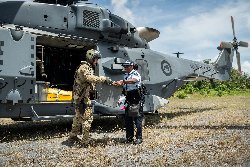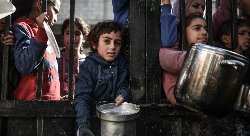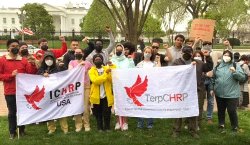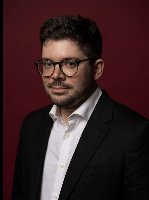Middle East countries discuss nuclear-free zone
At UN, Middle East countries discuss steps towards regional nuclear-free zone
18 November 2019
Representatives from across the Middle East are meeting at UN Headquarters this week in efforts to negotiate a legally binding treaty establishing a regional zone free of nuclear weapons and other weapons of mass destruction.
Speaking on Monday during the inaugural session of the deliberations on a nuclear-weapon free Middle East, UN Secretary-General António Guterres said the zone would have significance beyond the region.
“I therefore hope this Conference will serve as the start of an inclusive process in which all the States of the region can participate,” he said.
Currently, there are five nuclear-free zones
worldwide: in Latin America and the Caribbean, Africa,
Central Asia, Southeast Asia, and the South Pacific.
Not only do they eliminate any possibility of a nuclear conflict in these locations, they also provide a means for countries to work together on common regional security, according to Mr. Guterres.
“They also provide tangible security benefits by giving their members assurances against the use, or threat of use, of nuclear weapons. At the same time, these zones can provide additional assurance to the global community of the peaceful nuclear intentions of the countries in these regions,” he said.
Significance beyond the region
For the Secretary-General, these motives are important to the Middle East, where the overall situation remains a serious concern for the entire world.
The region has been scarred by ongoing complex civil wars involving non-state armed groups, terrorist organizations and regional and international military powers.
“Meanwhile, concerns over nuclear programmes persist and continue to drive tensions,” he said.
“We have yet to see meaningful accountability for the use of chemical weapons. There are signs of active arms competition, including the acquisition and use of new weapon technologies.”
Latin America and Caribbean an inspiration
The Middle East-focused meeting, which runs through Friday, marks the first session of a conference that will be held annually until a legally binding treaty for the nuclear-free zone is agreed.
The UN chief hoped participants will be inspired by the example set by Latin America and the Caribbean, where the first zone was proposed in the aftermath of the Cuban Missile Crisis in October 1962.
“Despite the tensions and politics of the Cold War, countries of the region persevered and in 1967 established a flexible and durable arrangement, which has served as a model for all such successive zones,” he said.
“Let us be guided by their experience – and those of other regions – as we advance in all of our efforts across the disarmament agenda.”
UN fight for nuclear disarmament
Although nuclear weapons have only been used once in history, the 1945 bombings of the Japanese cities of Hiroshima and Nagasaki during the Second World War attest to their devastation.
These are the most dangerous weapons on Earth, able to “destroy a whole city, potentially killing millions, and jeopardizing the natural environment and lives of future generations...,” as the UN Office for Disarmament Affairs has stated.
The UN was established from the ashes of the Second World War and has been working to eliminate nuclear weapons ever since, including through theTreaty on the Non-Proliferation of Nuclear Weapons (NPT), as well as theComprehensive Nuclear-Test-Ban Treaty (CTBT) and theTreaty on the Prohibition of Nuclear Weapons (TPNW), both of which are yet to enter into force.
ends


 Carbon Market Watch: Going For Green - Is The Paris Olympics Winning The Race Against The Climate Clock?
Carbon Market Watch: Going For Green - Is The Paris Olympics Winning The Race Against The Climate Clock? New Zealand Defence Force: NZDF Working With Pacific Neighbours To Support Solomon Islands Election
New Zealand Defence Force: NZDF Working With Pacific Neighbours To Support Solomon Islands Election UN News: Ceasefire The Only Way To End Killing And Injuring Of Children In Gaza
UN News: Ceasefire The Only Way To End Killing And Injuring Of Children In Gaza ICHRP: US-Japan-Philippines Trilateral Summit Makes The Philippines A Battlefield For US-China Conflict
ICHRP: US-Japan-Philippines Trilateral Summit Makes The Philippines A Battlefield For US-China Conflict East West Center: Environmental Journalist Alexander Kaufman Receives East-West Center’s Inaugural Melvin M.S. Goo Writing Fellowship
East West Center: Environmental Journalist Alexander Kaufman Receives East-West Center’s Inaugural Melvin M.S. Goo Writing Fellowship Compassion in World Farming: Octopus Farm Must Be Stopped, Say Campaigners
Compassion in World Farming: Octopus Farm Must Be Stopped, Say Campaigners